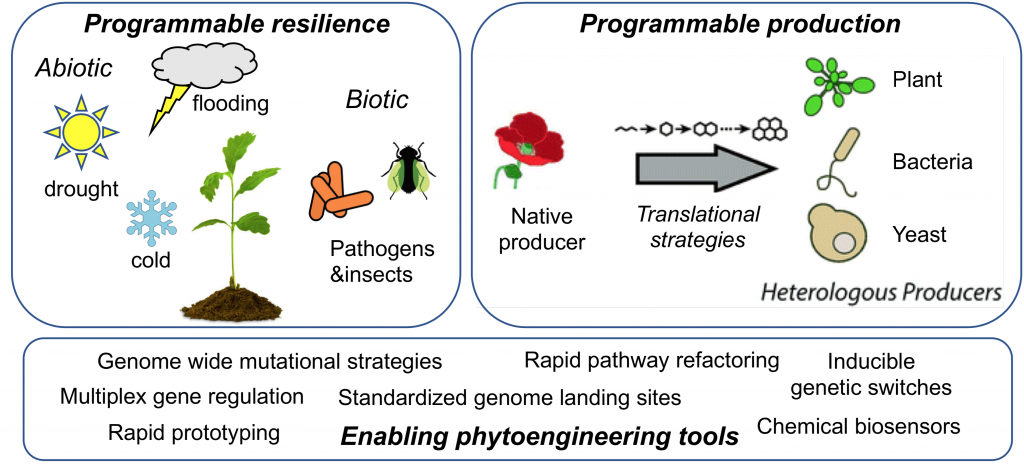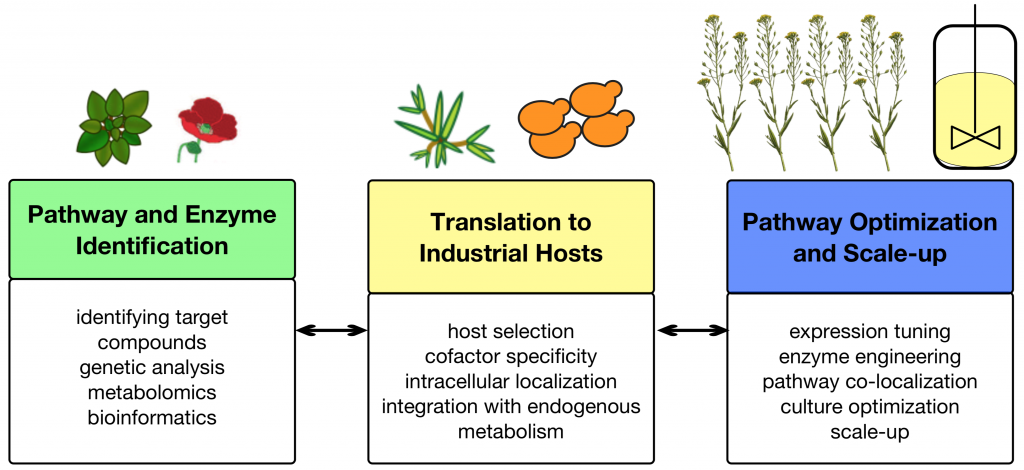The Plants3D research-training program facilitates the convergence of engineering and plant/microbe synthetic biology to enhance crop resilience and develop new biological manufacturing processes. Research on resilience to environmental pressures such as drought, flooding, heat or pests/pathogens is critical to improving crop yield stability.

Programmable production of plant metabolites:
Synthetic biology entails manipulation of metabolic and signaling pathways, through introduction and controlled regulation of genes within a targeted pathway. Projects in this area will provide a new generation of synthetic signaling and gene regulation components. These components (i.e., receptors, transcription factors, RNA/protein turnover machinery, microbiome) will enable the control of pathways that regulate stress tolerance in model plants and can be extended to crops. In place is in-depth knowledge of hormone receptors, key to drought and osmotic responses, and an understanding of protein turnover regulated by cellular signals ranging from O2 to hormones that control developmental plasticity to stress. Insights into conditions, signal physiological and responses provide opportunities for engineering regulatory components to enhance tolerance.
Repurposing of receptors and gene regulatory networks in plants to engineer abiotic and biotic stress tolerance and beneficial plant-microbe interactions
The substantial investment made in basic plant biology over the past several decades has paid off with a detailed understanding of how many physiological and developmental mechanisms are controlled at a molecular level. This knowledge lays the foundation for a new phase of research in which we discover how to engineer precise control of biological mechanisms such as abiotic or biotic stress responses, developmental phase transitions, resource allocation, and plant structures. For example, redesign of ABA receptors to be activated by an approved agrochemical, mandipropamid, creates a novel way to stimulate specific stress tolerance responses in plants
Production of plant secondary metabolites through multi-step processes in yeast
Recent examples of the semi-synthetic production of artemisinin, yeast rose-oil and resveratrol demonstrate that the biosynthesis of plant secondary metabolites in fast-growing, fermentable microorganisms, such as yeast and E. coli, is a potential alternative to traditional production by plant extraction. However, critical technical challenges limit the broad application of this strategy: (1) the biosynthetic routes of most secondary metabolites are not completely understood; and (2) once identified, the activity of these complex pathways are not readily recapitulated in microbial hosts. This project seeks to address these challenges by (i) designing dynamic expression systems that control the timing and level of each step in the pathway, thus limiting the metabolic burden of pathway expression and effectively driving carbon flux to the desired product; and (ii) modifying yeast physiology to better mimic native plant hosts and enable higher expression of critical enzymes.

